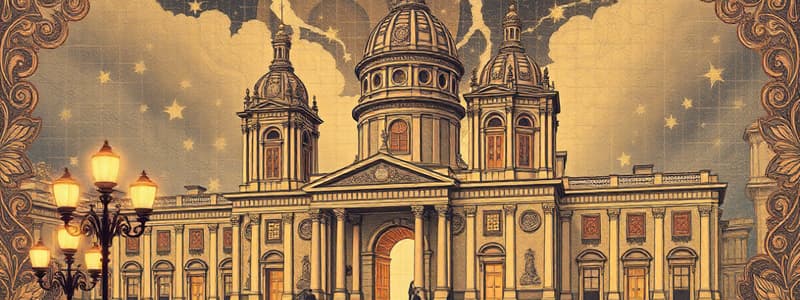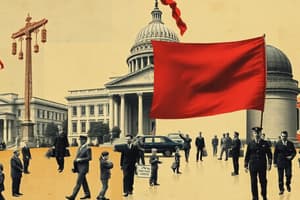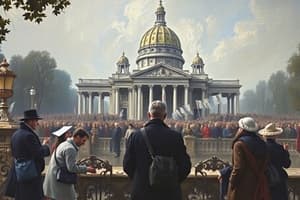Podcast
Questions and Answers
What term describes goods that all people may use but that are of limited supply?
What term describes goods that all people may use but that are of limited supply?
- Private goods
- Toll goods
- Common goods (correct)
- Public goods
In a direct democracy, people elect representatives to make decisions for them.
In a direct democracy, people elect representatives to make decisions for them.
False (B)
What is the primary distinction of an oligarchy?
What is the primary distinction of an oligarchy?
Political power rests in the hands of a small elite group.
A ________ is a government where political power is held by one ruler, often hereditary.
A ________ is a government where political power is held by one ruler, often hereditary.
Match the terms with their definitions:
Match the terms with their definitions:
Which of the following is a characteristic of public goods?
Which of the following is a characteristic of public goods?
Latent preferences indicate deeply held beliefs that do not change over time.
Latent preferences indicate deeply held beliefs that do not change over time.
What is political power?
What is political power?
Flashcards
Common goods
Common goods
Goods that all people may use but are of limited supply, like clean air or national parks.
Representative democracy
Representative democracy
A government where people choose representatives to make decisions for them, like electing a president.
Intense preferences
Intense preferences
Beliefs and preferences that people hold strongly and are unlikely to change.
Politics
Politics
Signup and view all the flashcards
Private goods
Private goods
Signup and view all the flashcards
Public goods
Public goods
Signup and view all the flashcards
Elite theory
Elite theory
Signup and view all the flashcards
Social capital
Social capital
Signup and view all the flashcards
Oligarchy
Oligarchy
Signup and view all the flashcards
Pluralist theory
Pluralist theory
Signup and view all the flashcards
Monarchy
Monarchy
Signup and view all the flashcards
Latent preferences
Latent preferences
Signup and view all the flashcards
Study Notes
Common Goods
- Goods that many people can use, but supply is limited
Democracy
- A form of government where power rests with the people
- Direct democracy: Citizens directly participate in decisions
- Representatives make decisions on behalf of citizens
Elite Theory
- Political power held by a small, influential group
Government
- The system by which a society organizes itself and allocates authority
Ideology
- Beliefs and ideals that shape political opinions and policies
Intense Preferences
- Strong feelings about an issue held over time
Latent Preferences
- Beliefs and feelings that aren't deeply held and might change
Majority Rule
- Core democratic principle; the majority's decisions bind everyone
Minority Rights
- Protections for those not part of the majority
Monarchy
- Government with a single ruler, often hereditary
Oligarchy
- Government where a small elite group holds power
Partisanship
- Strong support for a particular political party
Pluralist Theory
- Power distributed among various groups
Political Power
- Influence over government institutions, leadership, and policies
Politics
- The process of allocating resources and deciding on policies
Private Goods
- Goods available only to those who pay for them
Public Goods
- Goods available to everyone without charge
Representative Democracy
- Citizens elect representatives to make decisions on behalf of all
- Voters elect representatives
Social Capital
- Connections and interactions between individuals
Toll Good
- Goods available to many, but use requires payment
Totalitarianism
- Government with absolute power; no rights for citizens
Studying That Suits You
Use AI to generate personalized quizzes and flashcards to suit your learning preferences.




